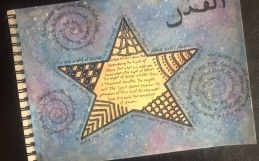Today being the 7th day of this beautifully blessed month of Ramadaan, I thought it appropriate to ponder on a set of verses which also number 7. These verses are recited by every Muslim numerous times a day, and as a result in most situations, is one of the first chapters that are taught to children. It is certainly one of the most commonly memorised religious texts in the world. Because it is recited so often, it is easy to overlook and truly appreciate the beauty and magnificence of it. I’ll be the first to admit whilst I’ve learnt the meanings to these 7 verses when still a child, I had stopped being conscious of what I was reciting.
I’m speaking about Surah Faatihah.
This is the first chapter of the Quraan, and with the month of Ramadaan often referred to as the Month of the Quraan, there can be no better time to learn about and to discuss these verses. If you want to perfect your prayers, begin with understanding what Surah Fatihah means. Ponder over the verses, look at the tasfir, understand that this surah is a conversation between you and your Lord.
Al-Fatihah means The Opening – It is named Al-Fatihah, the Opening – because it opens the Book and by its recitation, prayer commences.
[الْحَمْدُ للَّهِ رَبِّ الْعَـلَمِينَ ]
All praise and thanks be to Allah, the Lord of existence.
[الرَّحْمَـنِ الرَّحِيمِ ]
The Most Gracious, the Most Merciful.
[مَـلِكِ يَوْمِ الدِّينِ ]
The King of the Day of Judgement.
[إِيَّاكَ نَعْبُدُ وَإِيَّاكَ نَسْتَعِينُ ]
You (alone) we worship, and You (alone) we ask for help.
[اهْدِنَا الصِّرَاطَ الْمُسْتَقِيمَ – صِرَاطَ الَّذِينَ أَنْعَمْتَ عَلَيْهِمْ غَيْرِ الْمَغْضُوبِ عَلَيْهِمْ وَلاَ الضَّآلِّينَ ]
Guide us to the straight path. The way of those on whom You have granted Your grace, not (the way) of those who earned Your anger, nor of those who went astray
Ameen
Allah said, “I have divided the prayer between Myself and My servant into two halves, a half for Me and a half for My servant. My servant shall have what he asked for.”
These are the words of An-Nasa’i, while both Muslim and An-Nasa’i collected the following wording, “A half of Al-Fatiha is for Me and a half for My servant, and My servant shall acquire what he asked for.”
To summarise, the surah begins with the praise of Allah. It starts with mentioning 2 of the names of Allah, Ar-Rahmaan, and Ar-Raheem. Essentially reminding us of Allahs love and mercy towards His creation.
It immediately moves on to the phrase ‘Maaliki yaw min deen’ Master of the Day of Judgement. An immediate reminder that we will be held accountable for our actions, a reminder that this world is not our final abode!
The next verse reaffirms our belief in Tauheed-the worship of Only One Allah- absolute monotheism- it also is a reminder and a further declaration that Allah is our Helper and without Him we will be lost.
It ends with a prayer to constantly be guided to the path of enlightenment, and away from that of despair.
Subhan’Allah. Ponder over the beautiful conversation you are having with your Lord each time you recite Surah Fatihah. When we have an understanding or even partial comprehension of what it is we are reciting in our salaah, it certainly helps towards increasing our khushoo, our connection to our Rabb.

May this Ramadaan bring us ever closer to the Kalaam of Allah, the Quraan, and ultimately may it bring us closer to Ar-Rahmaan! Aameen
Latest posts by Ayesha Desai (see all)
- Reflections on Al-Fatiha - June 12, 2016
- Keeping a Home/Work Balance - February 20, 2016
- Butterflies and Spring Blossom - December 15, 2015
Related Posts





